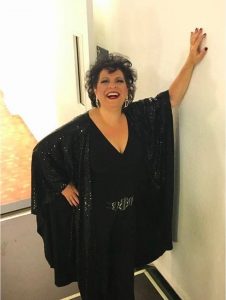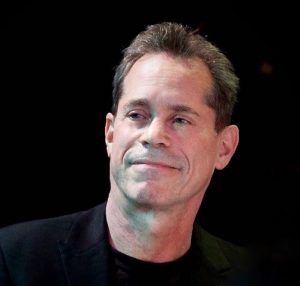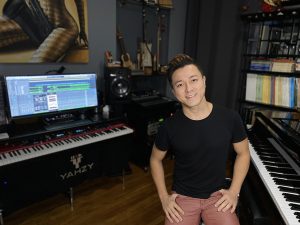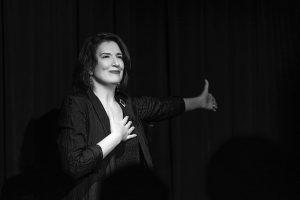The Musical Marriage Continues: Your Musical Director and You (Part Two)
Article #10 in this running series.

We’ll begin with Daryl Kojak, who has been the musical director for most of the Bistro Awards shows I’ve directed, all of them with many different performers. Daryl lists the “obvious” skills needed to be a great MD: To know a breadth of musical styles and have a good catalogue of songs in each genre; to be able to transpose and arrange. But when I asked him what quality he has learned over time to be critically important, his immediate answer was: listening. “You have to be able to listen to the singer to follow them … their breathing, that’s where the cues are … there’s so much information in the breath. But, Daryl adds, it’s important also “to listen to the singer when you talk about the song.” Flexibility is something Daryl also finds to be important. He will tell a performer when he thinks something doesn’t work, he’ll try and articulate for them why and how, and he’ll also give them other possible ways to play with the song. However, if they’re committed to their own idea, he will help them find a way to make it work as best as possible. “They have to know that onstage you’re going to support them no matter what, and you have to know that you’re going to support them no matter what.”

Laurie Krauz, the jazz singer who has worked primarily with Daryl for many years, says what makes Daryl special is that all musical creativity is focused on what the lyrics mean and are expressing. Neither of them ever want it to just become “fancy chord changes.” They never forget that there’s a story, even if the story in the arrangement has been changed from its original version. As a jazz artist, she loves the danger of not knowing what’s going to happen in the dance between voice and piano, but both for herself and so many others, “Daryl has this uncanny ability to channel the person he’s with in that moment, and be there, and cast a net so that person shines. It’s his artistry, but it’s also his kindness, and his generosity.”
There are still not enough women and people of color represented as musical directors in cabaret and even in musical theatre. Michele Brourman, when playing at the Cabaret Convention in the early ’70s, was the only woman on the stage at the piano as an accompanist and musical director. “There were no other female MDs. I found that shocking. I sat there for three nights crying.” It’s finally changing, but Michele was a real trailblazer. “Each of us brings our own set of skills, our own values, our own capabilities.” Once the singer defines herself, it’s easier to find the right fit with a musical director. “My job is to support the emotion of what they’re delivering,” says Michele, “to frame, to underscore, to mirror, to enhance, to orchestrate. I want to be the flying carpet that they sit on.”

Michele likens the work in the rehearsal room to the legal process of “discovery”—finding for the artist “what is present in them at this moment that needs to be expressed in song,” and sometimes encouraging them to dig down deeper. Then it’s finding where the song sits best, what tempo, what kind of arrangement. In performance, “you bring to the stage everything you’ve worked on, jump out of the plane, and pull the ripcord! But,” she added quickly, “I also anchor the singer, I have to be solid, so they have a place to come back to. So we jump together, but I’ve got one foot on the ground, and one on the pedal,” and then added playfully, “or off the pedal!” She also added that all performers—singers and musicians—should never “mark it” in rehearsal (not perform full out), but must go to the edge every time, otherwise they won’t go to the edge onstage.

Ian Herman started with a great piano technique, training, and musicianship, but he learned quite a few things through the years. From playing for Helen Gallagher’s performance class, he learned how to read from chord charts, improvise, and sight transpose. From playing for Felix Knight’s voice classes, he learned how to coach singers in terms of technique and placement. But the most surprising thing he’s had to learn over the years is to be more positive, to always start with the compliment, build them up. “But that’s because of my personality; I’m not naturally very complimentary,” Ian admits. But he definitely feels it’s been good for him. He’s also found that his energy and precision onstage is ideal for leading a band, and is often told he’s exceptionally “clear” with his onstage conducting.
Ian thinks cabaret has gotten too limited; he doesn’t think cabaret has to be any one thing, and he thinks it’s a mistake to listen to ‘cabaret experts’ about what cabaret is. He thinks all kinds of things work in cabaret, from a one-act play to just getting up and singing songs. He likes when people move onstage, but not randomly–when they use the stage well as they’re singing. He also feels that too much patter sounds rehearsed, and that very few people can do patter that sounds spontaneous when it isn’t.

Yasuhiko (Yaz) Fukuoka also speaks about versatility of genres, openness to ideas, flexibility, patience, and being an anchor for the performer, but adds a few notes of his own. Yaz finds important “the ability to oversee the show from the audience perspective and make suggestions from the musical point of view.” He has also cultivated a “willingness to work with singers who have difficulty narrowing down ideas” and offering “mental support for the singers and band members before and during the show.” Maybe that’s one of the reasons why Yaz finds planning and rehearsals to be the most fun: “when we get to try new things and experiment, exchange ideas and together create something bigger than the sum of our artistic scope.”

Tracy Stark mentions first and foremost musical versatility, especially “to be able to approach the broader ideas of music from all possible angles.” It’s also important to Tracy to be able to think fast, offer ideas, release one’s ideas, or be able to transform them. “I love when an arrangement ends up in a place I would never have gone by myself,” she says. What has she learned over the years? “That every vocalist/musician brings their own unique strengths, weaknesses, and personality to the table, both musically and psychologically.” So the less obvious skill that is really integral is intuition: “to intuit what is needed from person to person, project to project, and moment to moment.” Tracy loves an intense rehearsal process with a show that’s the same every time, but she also loves flying by the seat of her pants.

Meg Flather, singer and songwriter, credits Tracy with the essential element of humility: “She watches, she listens, she observes. She’s very connected to the vibe in the room; she knows how to bring out the best in each person.” She also creates an entire band with the piano: “She finds the bass in the piano … the drums … the guitar … and she knows when to be minimal and when to fill it up. She’s an intuitive.” She’s also a singer, and adds backing vocals as well.

As a director who knows music well because he’s a composer, Barry Kleinbort says he always tells people to remember that the MD is up there on stage with you. “If you have the right MD, you’re always going to feel secure, because you know wherever you go, they’re going to catch you.” Singers should not settle for pianists (who expect the singer to follow them and the music), but really find an accompanist, who follows you. He advises that you take five songs in the same order to five different potential musical directors, and you’ll know which one is the best for you to work with. If they just play “the ink” (the music as written), then they’re a pianist.
Common Mistakes Made by New Cabaret Artists
I asked all these MDs what mistakes they feel most new cabaret artists make. Ian says that new artists need to be more original, and do more homework. He advises new artists to go out and listen to all kinds of music, all different genres, find new and different songs. He also asserts the importance of learning songs the way they were written instead of someone’s arrangement, and, then, to interpret it for themselves. Tracy thinks new artists can get stuck in what they think they’re “supposed” to do, and too often leave their “unique quirks” out of the equation. Yaz thinks performers can also focus too much on themselves, not thinking enough about how the audience will react. Daryl says that many things, like nerves, can leave new artists with too much going on, and they end up outside of themselves when they’re performing, not really connecting to the material. He adds: Don’t do vocal gymnastics just for the sake of it. Michele agrees. She says it’s not about showing the four-octave range of your voice, but the four-octave range of your heart.
And, Yes, Even Veteran Artists Make Mistakes
What about the mistakes that longtime artists make? Most of the people with whom I spoke talked about musical artists falling into ruts, doing the same songs over and over, not challenging themselves, not growing as artists, and/or not shifting viewpoints on the material as they themselves grow and change.
But Tracy Stark said first: “I have to give appreciation and respect to any artist who continues to perform and create as a life-long occupation. As spiritually satisfying and life-affirming as it is to create music everyday, it is not the easiest road to travel, on numerous levels. I look at the people who are still plugging away … and I realize, these are the people who have no choice. They must tell their musical stories to continue living.”
These are some additional aspects and explorations of the musical director role. As I said in Part One, it is important that you work with a musical director who is adept at the aspects of the role you are most in need of. It is also important that they understand what you do and don’t expect from them. The more you understand what you need, the more easily you will find the right fit.
About the Author
Shellen Lubin is a veteran of both the cabaret and theatre worlds as a director, songwriter, performer, and voice and acting teacher/coach; she has directed the Bistro Awards for the last eight years. She is currently director/dramaturg in development with projects by Lanie Robertson, Stuart Warmflash, Amy Oestreicher, and more. Proud member of SDC and most unions and guilds in the theatre industry; Co-President, League of Professional Theatre Women; Past President, Women in the Arts & Media Coalition; Chair of the National Theatre Conference's Women Playwrights Initiative. She writes a weekly think piece read by thousands called "Monday Morning Quote." www.shellenlubin.com, www.mondaymorningquotes.com, @shlubin





I love both of these articles, Shellen! and the title is so apt. It really is a musical marriage between the singer and the MD. When it works, it’s utterly beautiful—we breathe together and sometimes we even
fly together! I love hearing from my colleagues and friends who are so talented and so generous.
It’s an honor to be included. -Michele Brourman
What a great series. As a vocalist I love to hear what all these MDs have to say about our work together. It truly is a musical marriage. At times it’s magic, at times really really hard. At ALL times the creative process we share is amazing! Thanks for this Shellen!
Your MD is your best friend, soul mate, and the one who drives the get-away car in case you have to get away. As far as female MDs go, we must not forget Joan Edgar who tickled the ivories in the Bay Area for many singers, including myself and Charles Pierce. Thanks. I will catch up one Part One.